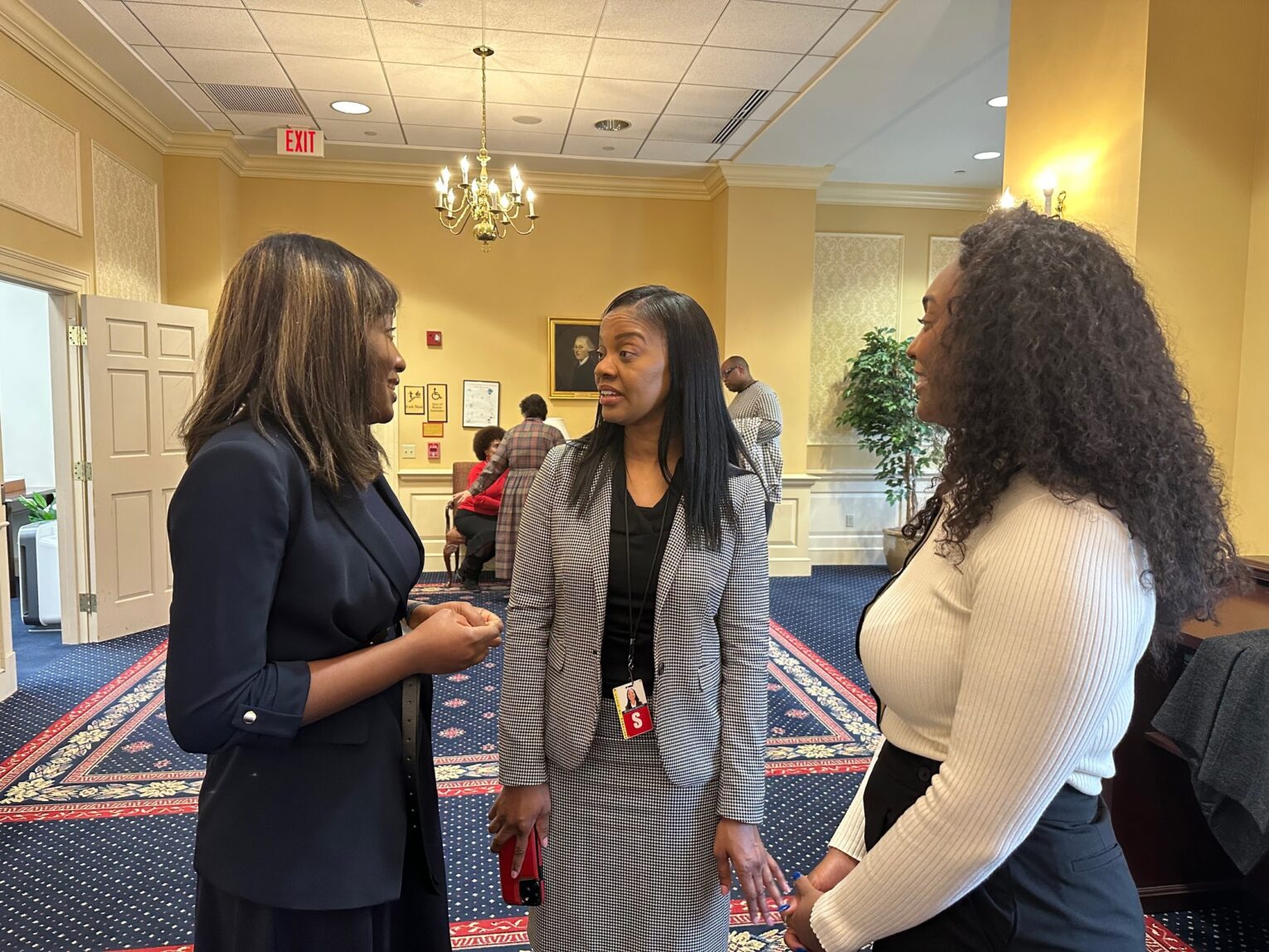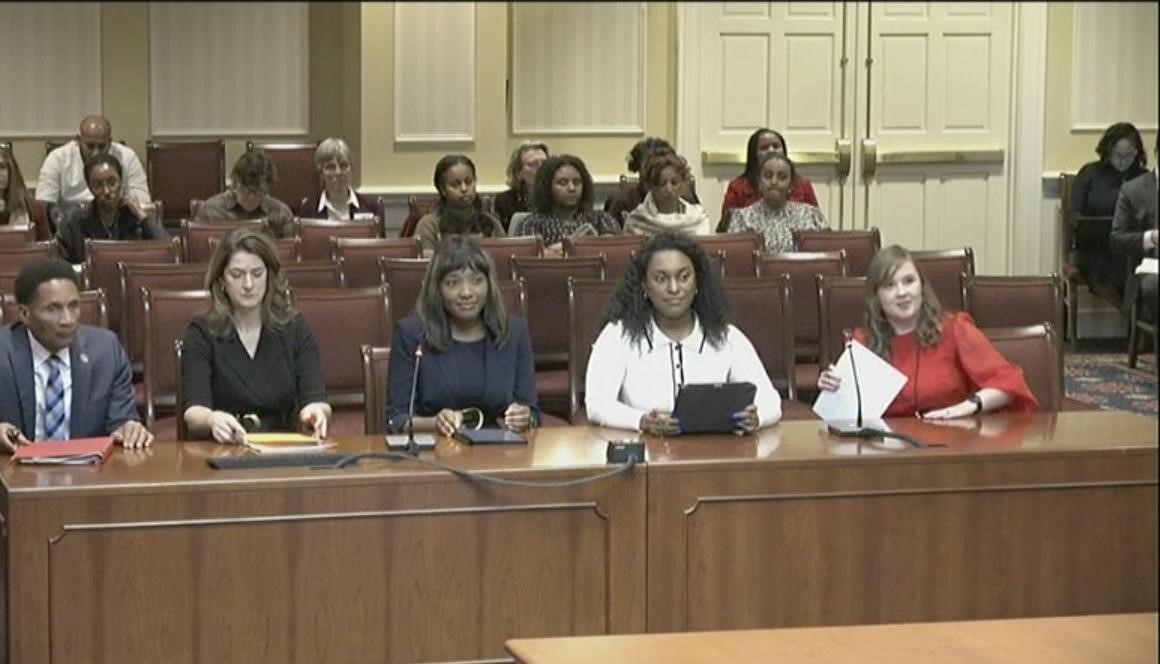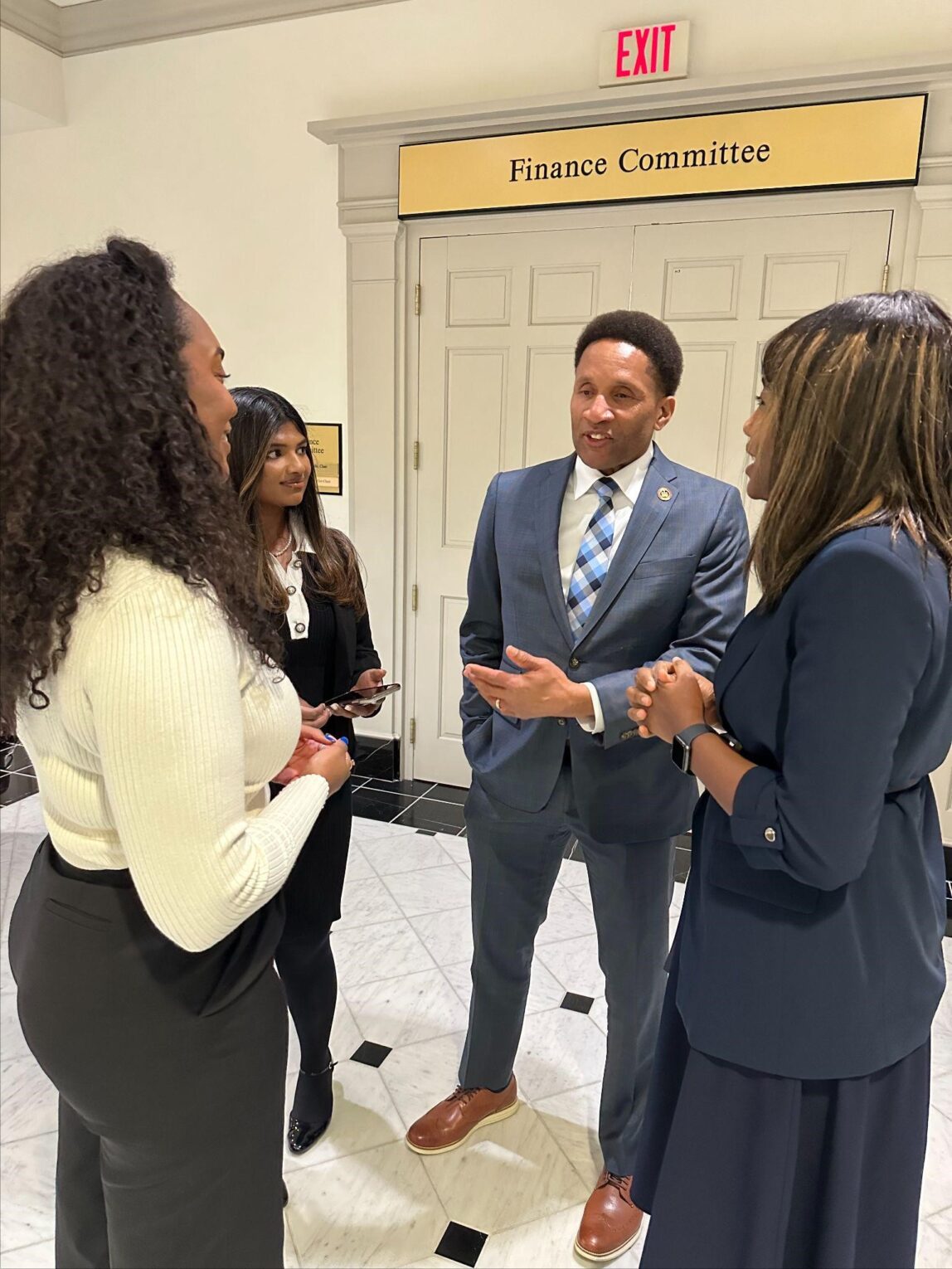The Power of a Conversation
It all started with a conversation. Back in October of 2024, the Black Maternal Health Legislative Summit was being held in Virginia. There, a special interaction took place that set the precedent for impactful advocacy for Black Women’s Health. Johns Hopkins Associate Professor and Associate Dean for Research Dr. Yvonne Commodore-Mensah, MHS, RN, along with PhD candidate and Research Program Coordinator Faith Elise Metlock, met with Maryland Senator Arthur Ellis and his Chief of Staff, NaToya Mitchell, MA, CPCO. Dr. Commodore-Mensah and Metlock spoke of their work and research studies centering maternal health, hypertension and, self measured blood pressure monitoring.

Dr. Commodore-Mensah and Metlock explained that they engaged over 450 women from Baltimore and Washington D.C revealing a striking prevalence of high blood pressure. Of these women, many expressed having challenges that limited their ability to consistently receive care or manage their condition. This struck a chord for Ellis and Mitchell. They expressed interest in implementing the study findings by developing legislation in Maryland to bridge this gap in access. Thus, a team was forged and a plan of action soon followed.
The Legislative Process and Our Role
A few weeks after their initial meeting, Dr. Commodore-Mensah and Metlock were invited to further discuss their research and explore how its principles could be integrated into legislative action to advance their cause. Dr. Commodore-Mensah and Metlock met with Senator Ellis and his team virtually and presented their findings from the SAFE HEART Women Study and LINKED-BP Study. They detailed cardiovascular health disparities among adults, pregnant and postpartum women, and the transformative impact of self-measured blood pressure monitoring on individuals’ health.
SAFE HEART Women Study focused on cardiovascular health disparities among women of reproductive age, particularly Black and Hispanic women. The research found alarming rates of hypertension and other cardiovascular risk factors among study participants. Interviews with the participants exposed disparate barriers to healthcare access such as transportation, financial strain, and lack of health education. The LINKED-BP Study examined the role of self-measured blood pressure monitoring and community health workers in preventing hypertension. Observed data demonstrated that self measured blood pressure monitoring coupled with community-based support significantly improves blood pressure and patient engagement. In tandem, these findings highlight a critical need for intervention, and provide tangible evidence that policies expanding self measured blood pressure monitoring devices can directly improve women’s health in Maryland.
With this information, Senator Ellis, Mitchell and other members of the Senator’s team drafted Senate Bill 94 and House Bill 553. Dr. Commodore-Mensah and Metlock were invited to review and provide feedback on the language of the bill and provide written testimony to be heard by the Maryland Senate Finance Committee.
These bills proposed to:
- Expand Medicaid coverage for self measured blood pressure monitoring and telemonitoring
- Ensure high-risk groups including pregnant and postpartum women and those with cardiometabolic conditions have access to this essential resource
- Provide additional support through community health workers
Testifying in Support of Senate Bill 94 & House Bill 553
Fast forward to 2025, the team gathered in Annapolis on January 28th to provide in-person oral testimony on Senate Bill 94 before the Maryland Senate Finance Committee. Dr. Commodore-Mensah and Metlock served as expert witness panelists alongside other nationally recognized organizations including the American Heart Association. Dr. Commodore-Mensah and Metlock’s testimonials echoed how Senate Bill 94’s goals align with their research findings. Metlock championed Maryland resident testimonies as she stated,
“Many women [expressed] how access to tools like self-measured blood pressure monitors, paired with education, would empower them to advocate for themselves and make healthier choices. Senate Bill 94 is a direct response to these needs –“
Dr. Commodore-Mensah emphasized how the implementation of this bill will be lifesaving as she explains,
“Hypertensive disorders can develop rapidly during pregnancy, often with devastating consequences for both mother and child if not detected and managed promptly… In my research and clinical experience, I have observed how access to self-measured blood pressure monitoring can serve as a vital early warning system, enabling timely intervention before complications become severe.“

The following day, House Bill 553 was then cross-filed and heard at the Maryland House of Delegates. Commitments during the day prevented Dr. Commodore-Mensah and Metlock from being at the hearing in-person, but as a result of passion-driven perseverance, they were able to join virtually via Zoom to deliver their testimonies.
Advocating for Senate Bill 94 and House Bill 553 was not a solo effort. From the time Dr. Commodore-Mensah and Metlock knew the bills were headed to official hearings, they began canvassing other experienced colleagues and inviting them to support this initiative. Dr. Kelly Bower, Associate Professor and Associate Director of The Urban Health Institute, and Dr. Ashley Gresh, Assistant Professor, stepped up to support by submitting written testimony in support of Senate Bill 94.
Dr. Gresh shared a powerful story of a client who benefited from self measured blood pressure monitor in action as she shared,
“[A patient] woke up feeling unwell, used the monitor, and discovered she was in a hypertensive crisis. Recognizing this as a critical danger sign, she sought immediate care, a decision that ultimately saved her life.”
Dr. Bower made the point that this legislation could decrease hospital readmission by presenting the fact that,
“Women who experience hypertensive disorders of pregnancy are at increased risk for postpartum hospital readmission as well as persistent hypertension, cardiovascular disease, and stroke later in life.”
Natalia Barolin, Senior Policy Advisor for the Johns Hopkins School of Nursing, and Annie Coble, Johns Hopkins Assistant Director of State Relations, went the extra mile to provide review of and feedback on the testimonial drafts. Dr. Commodore-Mensah and Metlock cite Barolin’s guidance as “invaluable”, stating that “[Her] support helped expand their reach, ensuring that more stakeholders within Hopkins and beyond were informed about the importance of Senate Bill 94 and House Bill 553.”
This collaboration not only showcased the power of nursing expertise in shaping health policy, it also exemplifies how academic institutions can serve as vital partners in bridging research and policy; equipping faculty, students, and researchers with the tools to effectively engage in legislative advocacy.
Additionally, this cause was strengthened by the support of key organizations committed to improving cardiovascular health and maternal outcomes in Maryland. Several organizations provided their expertise and endorsement, reinforcing the importance of expanding access to self-measured blood pressure monitoring. Special thanks belong to:
- • American Heart Association – Maryland
- • Maryland Department of Health
- • American College of Obstetricians and Gynecologists
- • MedChi, The Maryland State Medical Society
- • Federally Qualified Health Centers including TotalHealthCare

Their collective support underscores the broad coalition of healthcare professionals, public health advocates, and policymakers who recognize the urgent need for this legislation. This widespread backing further reinforces why Senate Bill 94 is a critical step toward addressing health inequities and improving cardiovascular outcomes in Maryland.

Why This Matters as Nurse Policy Advocates
Nurses and researchers are on the frontlines of health equity, witnessing firsthand the struggles of patients who lack access to essential healthcare resources. Policy offers the most effective, upstream solution for driving meaningful, systemic change. This collaboration demonstrates the power of lawmakers working with experts to identify citizens’ pressing needs and create thoughtful interventions. By bringing evidence-based research into legislative conversations it ensures that communities receive informed solutions to their healthcare challenges and reinforces the critical role nurses can play in legislative advocacy. Healthcare should be shaped by those who work directly with patients—and that includes nurses.
About The Author:
Faith Elise Metlock is a PhD candidate at the Johns Hopkins school of Nursing. Her research focuses on social determinants of health and its impact on the prevention and self-management of cardiovascular conditions in underserved groups.
